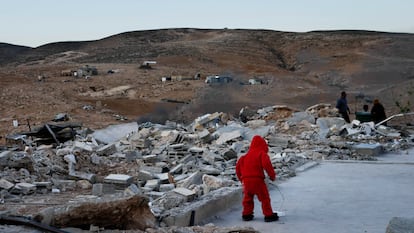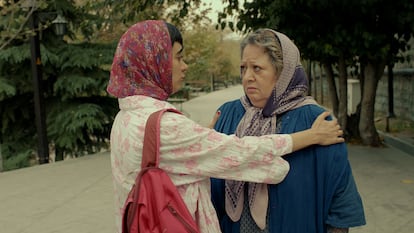The Berlinale on the war front: How the Israel-Palestine conflict undermined the film festival
While the competition was accused of taking a lukewarm stance on the Middle East crisis, Berlin has refuted the criticism with several films and debates
Lupita Nyong’o, an Oscar winner for playing a slave, a Marvel heroine and the first Black president of the jury at the Berlinale, declared at the start of the event: “I’ve heard [that the festival is very political] a lot in the last 48 hours. I’m curious to learn what that means.” It did not take her long to find out: since its inception, the Berlin International Film Festival has faced several different storms derived from the crisis in the Middle East. Already on the red carpet of the opening gala, several guests wore messages of support for Palestine and for the ceasefire, such as director Eliza Hittman, whose film Never Rarely Sometimes Always was recognized by the Berlinale in 2020. Inside the event, some speeches alluded to the elephant in the room: the much-criticized distance that the festival keeps from the conflict between Israel and Palestine.
Far from calling for a ceasefire, as its detractors demand, the festival has preferred the game of balance, a sign of how tricky it is to criticize Israel in the country that was responsible for the Holocaust. Before the beginning of this edition, its directors, Carlo Chatrian and Mariette Rissenbeek, expressed their “sympathy” to “all the victims of the humanitarian crises in the Middle East and elsewhere” and expressed their rejection of antisemitism and Islamophobia. However, that rhetoric did not please the Berlinale workers themselves, who wrote an open letter urging their leadership to “take a stance that is consistent with those taken in response to other events that have struck the international community in recent years,” such as the war between Russia and Ukraine.
Two directors of the parallel program Forum Expanded withdrew their films as a sign of support for the Strike Germany collective, which calls for the boycott of all activities dependent on German state funds, such as this festival. The group urges agents in the cultural sector not to participate in them until Berlin puts an end to “McCarthyist policies that suppress freedom of expression,” specifically, “expressions of solidarity with Palestine.”

Despite everything, several films in this edition deal with the conflict and its geopolitical consequences. The most notable is No Other Land, which was screened last Saturday in the parallel section Panorama. The documentary, by a collective of four Israeli and Palestinian directors, follows the gradual, decades-long destruction of Masafer Yatta in the West Bank by the Israeli army with the aid of bulldozers. “There is a lot of talk about reconciliation and coexistence, but it is not an idea that we defend. We prefer to talk about joint resistance,” said two of its creators, the Israeli journalist Yuval Abraham and the Palestinian activist Basel Adra, who lives in Masafer Yatta, where he grew up. “It’s not about talking to become friends. Our alliance is based, above all, on political opposition to the occupation. If we want a future where Israel and Palestine can have a connection, we have to be equal.” Although they think that the Berlinale’s indifference is “a shame,” they did not want to boycott the festival: “Here, we reach a massive audience, which was the ultimate goal of this project.”
Theirs is not the only title that seeks to draw attention to the delicate situation of the region and the origin of the religious conflict. Diaries from Lebanon, by Myriam El Hajj, portrays three generations fighting corruption in their country, while Holy Week, by Andrei Cohn, digs up the roots of antisemitism on the European continent through a story set in the Romania of the 1900s. Also, somewhat further, but still in the Middle East, My Favorite Cake, by the Iranians Maryam Moghaddam and Behtash Sanaeeha, denounces the repression of freedoms in Iran while showing an old woman dancing and drinking alcohol. The country’s regime banned its directors from traveling to the Berlinale, which reserved two empty seats for them as a sign of protest during the screening of the film, a somber elderly romantic comedy with award-winning potential. Its directors were not surprised by the veto: “It has everything that is forbidden for women and that is not allowed to be shown in the movies,” they assured Variety.

A mobile debate
To avoid criticism of immobility, the festival adopted two initiatives: it held a debate after the premiere of No Other Land, and it is presenting a project called Tiny House, a mobile initiative created to debate the conflict in German schools and public spaces. The project consists of a house on wheels with capacity for six people, which was installed throughout the weekend in the vicinity of the festival; attendees were encouraged to enter and debate with strangers, expressing their opinions on the conflict in the Middle East. The results will later be shared in podcast form.
The creator of the initiative is the actor and presenter Shai Hoffmann, a German Jew with Israeli roots, who has led these spontaneous debates together with the Palestinian academic Ahmad Dakhnous. “It is important to talk about this conflict in the context of the festival, on a large stage, but it is also important to be able to debate in a more intimate, quieter format,” they explained. Theirs is a debate without limits — with one exception: “Freedom of expression ends when international rights are violated.”
Sign up for our weekly newsletter to get more English-language news coverage from EL PAÍS USA Edition
Tu suscripción se está usando en otro dispositivo
¿Quieres añadir otro usuario a tu suscripción?
Si continúas leyendo en este dispositivo, no se podrá leer en el otro.
FlechaTu suscripción se está usando en otro dispositivo y solo puedes acceder a EL PAÍS desde un dispositivo a la vez.
Si quieres compartir tu cuenta, cambia tu suscripción a la modalidad Premium, así podrás añadir otro usuario. Cada uno accederá con su propia cuenta de email, lo que os permitirá personalizar vuestra experiencia en EL PAÍS.
¿Tienes una suscripción de empresa? Accede aquí para contratar más cuentas.
En el caso de no saber quién está usando tu cuenta, te recomendamos cambiar tu contraseña aquí.
Si decides continuar compartiendo tu cuenta, este mensaje se mostrará en tu dispositivo y en el de la otra persona que está usando tu cuenta de forma indefinida, afectando a tu experiencia de lectura. Puedes consultar aquí los términos y condiciones de la suscripción digital.









































